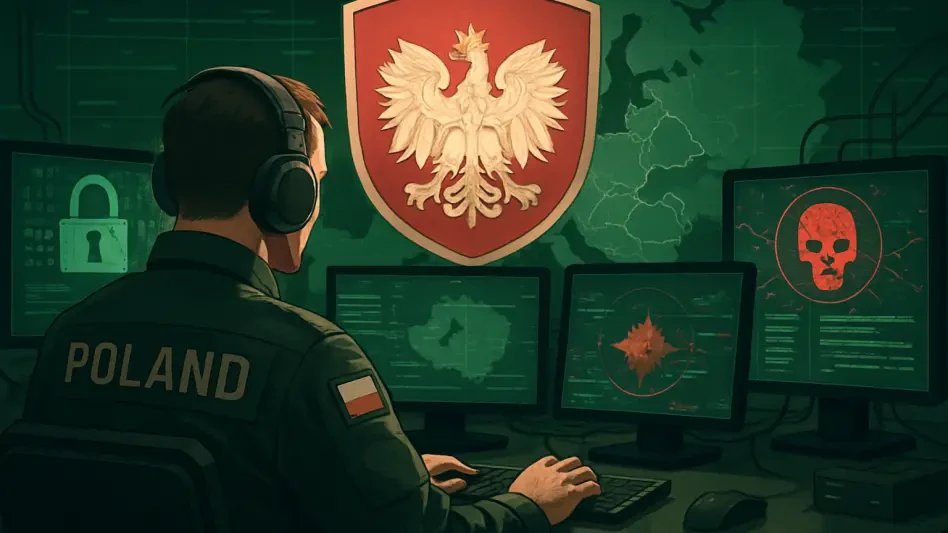What happens when a nation’s hospitals grind to a halt, water systems teeter on the brink of collapse, and GPS signals vanish under mysterious interference? Poland faces this chilling reality daily, locked in a silent but ferocious digital war against Russian cyberattacks, where hackers strike at the heart of critical infrastructure. This invisible battlefield poses a threat as real as any physical invasion, challenging the resilience of a key European ally.
The significance of this struggle extends far beyond Poland’s borders. As a frontline state in the European Union and a staunch supporter of Ukraine, the country has become the primary target of Russian cyberwarfare, enduring an unprecedented barrage of digital sabotage. With 20 to 50 attacks hitting essential services each day, the stakes couldn’t be higher—national security, public safety, and regional stability hang in the balance. This story unveils how Poland is fighting back with a historic €1 billion cybersecurity boost, a move that could redefine how nations defend against digital aggression.
A Nation Under Siege: The Digital Frontline
Poland’s digital landscape has transformed into a relentless battleground, where Russian hackers target everything from healthcare to public utilities. A single successful breach can disrupt entire communities, as seen in a near-catastrophic attempt to shut down the water supply of one of Poland’s largest cities. Though thwarted at the last moment, the incident revealed the terrifying potential of these attacks to cripple daily life.
Beyond isolated events, the sheer volume of assaults paints a grim picture. Critical sectors face constant probing, with hospitals reporting halted operations and compromised medical data when defenses falter. This ongoing siege underscores a broader campaign of disruption, where digital strikes aim not just to damage infrastructure but to erode public trust in the systems that sustain society.
Russia’s Cyber Offensive: Why Poland Is Ground Zero
Geopolitical tensions, amplified by Poland’s unwavering support for Ukraine, have positioned the country as the epicenter of Russian cyber operations within the EU. Since the escalation of conflict in Eastern Europe, the sophistication and frequency of these attacks have surged, reflecting a deliberate strategy to weaken a key NATO member. Poland’s role as a logistical hub for aid to Ukraine only intensifies its status as a prime target.
Western intelligence has linked Russia to specific acts of sabotage, including up to 30 GPS jamming incidents near Kaliningrad over the past year. One notable disruption affected a plane carrying a U.K. defense official, highlighting how these tactics endanger not just civilian life but military operations. This persistent hostility signals a broader intent to destabilize the region, exploiting digital vulnerabilities as a weapon of hybrid warfare.
Dissecting the Attacks: Targets and Devastating Potential
Russian hackers employ a wide array of tactics, from infiltrating IT networks to disrupting navigation systems, with a staggering 20 to 50 daily attempts on Poland’s infrastructure. High-profile targets include water management systems, where a major city narrowly escaped a total shutdown after attackers breached digital controls. Such incidents expose the fragility of interconnected systems in the face of determined adversaries.
Healthcare facilities have also borne the brunt of this onslaught, with successful breaches suspending critical operations and risking patient safety. Despite Poland’s impressive 99 percent defense rate, the 1 percent of attacks that penetrate these barriers can wreak havoc, amplifying the urgency for stronger safeguards. Each breach serves as a stark reminder that even a small failure rate carries outsized consequences in a hyper-connected world.
Voices of Resolve: Polish Leaders Confront the Threat
Polish officials have been vocal about the multifaceted nature of Russia’s campaign to undermine the nation. Prime Minister Donald Tusk has warned of a coordinated effort combining cyberwarfare with physical sabotage and political interference, aimed at fracturing societal cohesion. His statements reflect a deep concern over Moscow’s intent to strain Poland’s alliances, particularly with Ukraine.
Deputy Minister for Digital Affairs Dariusz Standerski has emphasized the relentless pressure on critical systems, describing a daily struggle to protect essential services. Corroborating these fears, Western intelligence reports have tied Russia to specific disruptions like GPS jamming, reinforcing the credibility of Poland’s alarm. These authoritative voices paint a vivid picture of a nation under siege, grappling with an enemy that operates in the shadows of cyberspace.
Poland’s €1 Billion Defense: Building a Digital Fortress
In response to this unyielding threat, Poland has committed a record €1 billion to cybersecurity for the year, a sharp increase from €600 million in the previous budget cycle. This financial surge includes an immediate €80 million allocation to secure water management systems, addressing one of the most vulnerable sectors. The investment signals a proactive stance to shield public infrastructure from future assaults.
Beyond emergency funding, a comprehensive plan targets long-term resilience across 2,400 local administrations, ensuring that even smaller municipalities are fortified against digital incursions. This dual approach—combining rapid response with strategic planning—has garnered rare bipartisan support in Poland’s often-divided political arena. Such unity underscores the gravity of the threat and the determination to counter it with robust, actionable measures.
Reflecting on a Digital Standoff: Lessons and Next Steps
Looking back, Poland’s battle against Russian cyberattacks reveals both the nation’s resilience and the daunting scale of the challenge. The ability to repel 99 percent of daily assaults stands as a testament to existing defenses, yet the damage inflicted by the remaining fraction exposes critical gaps. Each incident, from hospital disruptions to near-miss water system failures, highlights the urgent need for vigilance in an era of hybrid threats.
Moving forward, the €1 billion investment marks a pivotal step, but sustained effort remains essential. Strengthening international cooperation, sharing intelligence on cyber threats, and investing in cutting-edge technology could further bolster Poland’s defenses. As digital warfare evolves, nations must adapt swiftly, recognizing that cybersecurity is not just a national issue but a global imperative demanding collective resolve.








